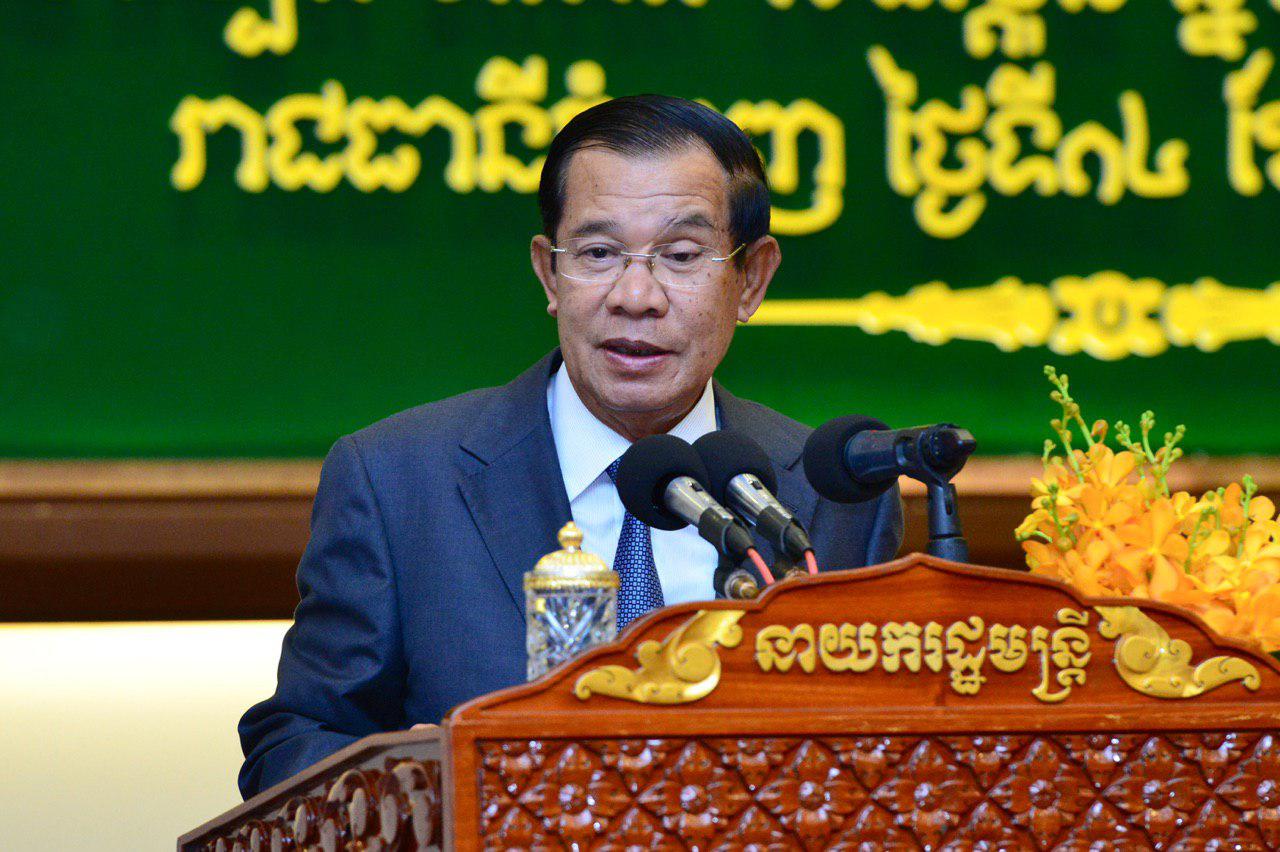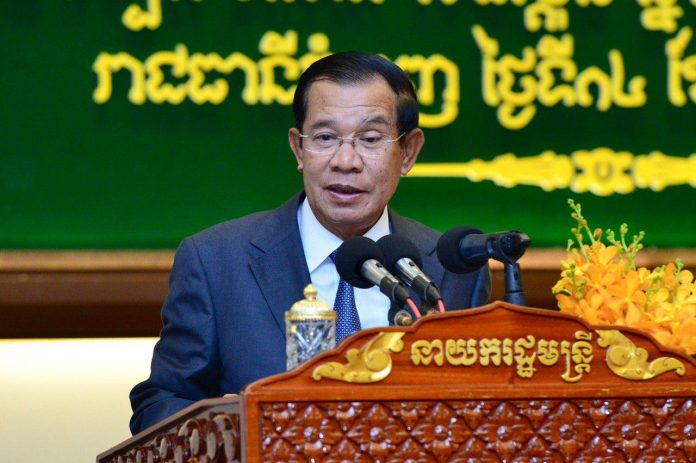In addition to the prepared text, Samdech Techo Hun Sen made extempore comments on a number of issues that CNV provides unofficial translation of excerpts here followed:
 Reducing Production Cost to Succeed Rice Export Target
Reducing Production Cost to Succeed Rice Export Target
In agriculture, though we have achieved growth, among the two objectives that we have set for rice cultivation and export, we realized only one – to increase rice cultivation and production. We started when we had not enough rice for consumption to later with some surplus. As of present, the surplus has reached roughly six million metric tons of paddy rice or about over four million metric tons of milled rice. However, for our target to export about one million metric tons of rice, we have not realized yet. What are the main problems behind this? Previously, we used to talk about having no paper to wrap up gold or lacking capacity to mill rice that we have for export. Lately, though, we could process between three and four million metric tons of rice […] one of the problems that we should see is that Cambodia never succeeded in bidding competition for rice to go into the Philippines market against competitors from Vietnam and Thailand. Our agricultural production cost was higher […] we must work together to reduce production cost to lower our price for the sake of markets competition […]
Mechanized Land Preparation Increases Cost
We are proud to see that about 96% of land preparation for cultivation are mechanized and lesser size done by animals. We must be aware that there are pros and cons in mechanizing land preparation, cultivation and harvesting agricultural produces. The pro is that we have achieved our goal of mechanized farming. We could be proud of it. However, the con has been that when mechanized farming gets to a certain level, cost of production also varies to higher because mechanization requires used of fuel and that would cost more money than works done by animals.
To Cease Raising Animal for Meat/Transport Is a Disaster
Our farmers have now been using less and less animals in their farming practices. They raise them only for meat. That would be fine. We must see that to stop using animal in agricultural activities and raise them only for meat is not a bad option. However, what concerns us is when they stop raising animals at all either for meat or for transportation. That would be a disaster. We must see loss that is coming ahead of us […]
To Pump Water by Electric Power, More Investment for Animal Feeds
The other day I talked about reducing use of fuel in pumping water and encouraging people to use electricity to do so. The Ministry of Mines and Energy, especially the Electricity Department, will have to increase its transmission coverage to areas with water sources so that pumping can be done […] the Ministry of Agriculture, Forestry and Fisheries and the Ministry of Water Resource and Meteorology can be starting points on this matter […] we change from using fuel to pump water to using electricity to bring water into water canals […] the best way to boost animal husbandry is to attract more investments in producing animal feeds and those investors do not have to come from abroad. In Cambodia we have billionaires and millionaires who can contribute to rearing animals in Cambodia […]
ASEAN Competition of Similar Produces
We are still facing challenges. Our exports have been facing tough competition in the ASEAN region – for instance in Greater Mekong Sub-region or ACMECS, because we have similar produces. We in ASEAN are competing with each other. For some countries their products such as planes – Air Bus or Boeing, they do not have tough competitions. Cambodia, Vietnam, Thailand, Myanmar are producing rice altogether and we compete with each other. This has led to price lowering […]
No to Subsidy Measures
That is how the market works. We are working with free market mechanism. We have no other choices. The best way to compete is to cut cost of production. We cannot resort to subsidizing measure […] that would be against the regulation of the World Trade Organization. Some developed countries have been doing subsidy for their farmers. Cambodian would not be doing that […] we must seek ways to reduce cost instead […]
Do Not Change Crops after Price Fluctuations
The Ministry of Agriculture, Forestry and Fisheries must continue its research and development extension to enlighten our people about market and price fluctuations. They should not keep running after the market demands for different crops prices each year […] they must see that price and market fluctuation is a normal economic process […] they should not chop off their crops to grow new ones every few years just to run after prices. From its part, the Royal Government has feathered its taxation policy for rubber export for example as a way to relieve economic pressure […]
To Pull Up Rice Costs
We must continue to make use of the 400,000 metric tons of rice allowed to the China market and 300,000 metric tons of rice to Vietnam market to pull up rice prices for our farmers. The Ministry of Trade and the Ministry of Agriculture must work on this front together […] tonight my wife and I will have a personal welcoming dinner with President of the Republic of Korea and his wife. We will conduct negotiation and chair business forum together the following day. The visiting President and his wife will be hosted official dinner party by HM the King too. In tonight’s dinner, I will try to seek the Korean side to help purchase produces from Cambodia […]
Expanding Markets for Certain Growth and Withstanding Crisis from Outside
We cannot leave our country’s produces and production to depend on any given market. We cannot allow ourselves to be suffocated. This year I will travel to Eurasia region for the sake of expanding the market. We also are working towards accessing markets in the Middle East. We will open our market access wider. In the past, we bought almost everything from other countries or outside. We imported everything. As of present, we have certain goods to export. We must work together to ensure that our economy will attain certain growth and can withstand crisis from outside […] I met with business leaders from Japan yesterday. He expressed concern about fall of world economy in the time of trade war. He also sees instead economic growth in ASEAN […] though we have to think about impacts from economic crisis due to fall in world economy, as predicted by IMF and World Bank, since we are part of the world, we see that there would be some but not major impact on us. We should be proud, happy but also working together to deal with challenges ahead […]./.






